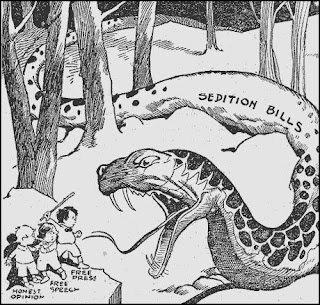Can Reason Prevail?
"When morning first blush'd illume'd in the East,
I haste to my daily employment;
I grub all the day, while the well-born feast,
Tho' they can afford the enjoyment.
Our rulers can feast on six dollars per day,
the poor must be taxed their extortion to pay;
and if we do against them anything say,
they will trump a bill of sedition."
-Isaiah Thomas, "The Sedition Act Song", 1798
Image above entitled "As Gag-Rulers Would Have It" by Satterfield in the Jersey City Journal
During what historians call the 'peaceful transfer of power' at the inauguration of 1801, then president, Thomas Jefferson, stated, "But every difference of opinion is not a difference of principle. We have called by different names brethren of measures of safety. We are all Republicans, we are all Federalists. If there by any among us who wish to dissolve this Union, or change its republican form, let them stand undisturbed as monuments of safety with which error of opinion may be tolerated where reason is left free to combat it." Jefferson and his party understood the importance of free speech and free thinking after a time of staunch silencing from the Federalists under previous president John Adams. All opinions were to be valued and respected--even those thoughts that did not align with republic--however, Jefferson understood if reason remained the chief virtue among the citizenry--if the ability to think, challenge, and debate opinions remained a consistent reality in the public forum, right would overcome wrong, rational would overcome irrational, the truth would prevail and a better more improved republic would live on.
Today's America is somewhat similar and also quite different from Jefferson's. The similarity lies in the bipolarization between Federalists (those who trusted the Federal government and its institutions) and the Jeffersonian-Republicans (those who challenged the Federal government and distrusted its institutions). We can see the same dichotomy today with Democrats and Republicans. Another similarity lies in the censorship pervasive during wartime as evidenced by John Adams's Alien and Sedition Laws--acts passed by a Federalist-controlled Congress to silence Jeffersonians and those who allied with the French revolutionaries during our Quasi-War with France on the high seas.
The silencing of the Jeffersonians was successful as many American citizens were censored for libel against the Federalists. The result ushered in a new era for the Jeffersonian-Republicans as the Federalist party dissipated and Jefferson won the election of 1800 (Jefferson pardoned those convicted under the Alien and Sedition law).
America today is not immune from censorship in wartime the same as it was back then. For example, Woodrow Wilson's Sedition Act during World War I, the Patriot Act during the Iraq war, and today, the war over big tech censorship and the war in Ukraine serve to continue to keep Americans who wish to debate the issues, in a compromised and deflated position. The result could lead to more catastrophic bipolarization in the months and years ahead.
As Vivek Ramaswamy, Republican presidential candidate so eloquently stated in a recent Tweet on August 1, 2023, "It is wrong and incorrect and inaccurate to place blame for what happened on Jan. 6 at the feet of Donald Trump...you want to know what was responsible? I said this in the days after Jan. 6, 2021, just as I say it today-- systematic pervasive censorship in this country that was after a year where we had told people across this nation that you had to stay locked down in your house in your basement and shut up sit down and do what you're told if you question that you're racist, you're anti-science, your social media accounts were silenced. You had to stay home and locked down unless you were part of BLM or Antifa in which case it was perfectly fine to roam the streets of this country and burn many of them down." (Tweet @VivekGRamaswamy, Aug. 1, 2023) Ramaswamy went on to say, "And if you repeatedly then tell people they cannot speak, if you repeatedly tell people they cannot scream, that is when they tear things down." (Tweet @VivekGRamaswamy, Aug. 1, 2023) Ramaswamy's interpretation of what led to January 6th gives much to pause and consider.
The differences between Jefferson's America and today's however, is strongly evidenced by the lack of civic knowledge and engagement among young Americans. The idea of virtue during Jefferson's time was placing the interests of others over one's own interest and electing representatives who would protect the natural rights and property of people (granted this included slaves-- Jefferson's own actions against slavery as evidenced by his drafting the Declaration of Independence and the Northwest Ordinance would bring about stronger aversion to the peculiar institution) is foreign to many Gen Xers who may consider exhibiting a TikTok makeup tutorial as part of their civic duty.
One man stands out in American history as one who enveloped civic duty while challenging his government to 'do the right thing'. This was Henry David Thoreau. After being confronted by a police officer for refusing to pay his poll tax, Thoreau was sent to prison. It was here where he began writing his essay "On the Duty of Civil Disobedience". His essay begins, "I heartily accept the motto--'the government is best which governs least,' and I should like to see it acted up to more rapidly and systematically." At the time, the U.S. government was justifying war with Mexico and slavery was considered 'moral' and 'just'. Thoreau believed everyone had the right to speak up especially if it meant standing up to a corrupt and immoral government. He believed that if normal citizens had honed their consciences, there wouldn't be need for more laws and more government. His essay propels Americans to ask 'to what degree do I and should I trust my government'? Is it the duty of government to provide the necessities for its people? Or is it the duty of the people to provide for themselves and one another? And if it is the duty of the people to help others, what motivates a person to put someone else's needs ahead of their own?
Questions like these ought to be asked by every American. But they are not and this leads me back to Jefferson's inaugural quote on rationality. If rationality is silenced, or labeled 'conspiracy'--if rationality is not taught or modeled to younger people by parents, neighbors, representatives, and teachers--than it no longer is valued. In a country with growing illiteracy and social degeneracy pervading the culture, where can reason combat the error of opinion? If not in higher education, if not in the media, if not at the kitchen table...then where?




Comments